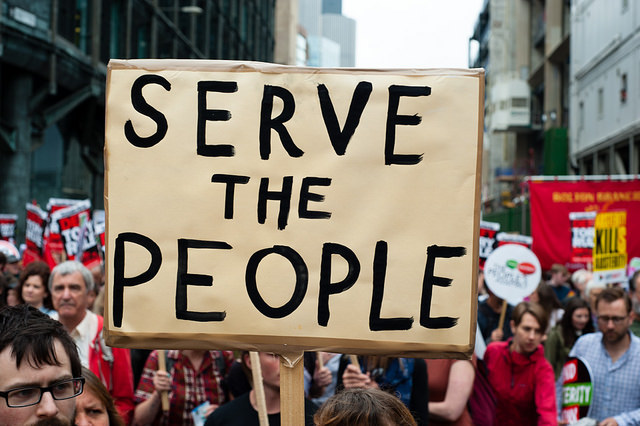Chip in to keep stories like these coming.
Austerity is practiced by people on a spiritual path. It involves turning inward, seeking the source of creation within one’s self. In meditation and yoga, the attachment to external sensory inputs is dropped. The “outside world” is accepted as it is, but no particular importance is given to it.
Austerities such as a simple diet and clothing, an unadorned living space, fasting, or sitting motionless for prolonged time periods may be helpful in attaining a deeper inner calm.
Government austerity is an oxymoron. The responsibility of governments is to engage with what is happening in the external world, monitoring developments and responding when appropriate, thereby providing citizens a reasonable assurance of security and prosperity.
Governments also act as initiators of change. For example, when governments sponsor public events, ceremonies, and celebrations with artistic performances, music and dancing it may remind citizens that the state also has a wider role of providing essential services that promote peace, order and good government. Culture, national symbols and a degree of national pride can give legitimacy to the various roles of government.
If governments turn inward, or become divisive and lose sight of the social contract they have with all citizens (regardless of political affiliation), bad things can happen. Rather than a functional state, one may have a succession of factions struggling for power, with internal strife and even civil war. More subtle abuses can occur when governments spy on citizens, suppress freedom of assembly and speech, or harass civil society groups that advocate for reform.
When government officials propose austerity measures, it invites scrutiny of their behaviour. Are these officials showing favouritism to wealthy, powerful or politically well-connected individuals? Padding their travel claims? Awarding themselves excessive salaries or bonuses?
Independent oversight mechanisms can help ensure that government officials resist these temptations. But it bears repeating that austerity just doesn’t fit with the roles of government.
When government officials start talking about austerity, it doesn’t mean that they intend to practice it themselves, but to impose it on the citizenry. When they talk about measures to reduce public expenditures in the name of reducing budget deficits, they would prefer not to add that this will create difficult economic conditions and hardship for many people, especially the poor.
Elected officials may argue that austerity is necessary. But necessary for whom? A cynic might say, necessary to maintain the lifestyle of the privileged few, the powerful one percenters.
If you believe that money is all-important and there is not very much of it, you too may fall into the trap of believing that economic austerity is necessary. But this means shrinking government and household expenditures, social services, jobs and future prospects for your children. However, not everything shrinks under government-imposed economic austerity. When more people are marginalized, there may be a perception that crime rates are increasing. Even if this is untrue, it can lead to a demand for more security forces, more jails, and longer criminal sentences.
Don’t fall into the trap of thinking that governments should always be shrinking. While keeping an eye on budgets and finances is certainly important, governments should spend money and do things. They should help keep society moving and keep tabs on what is happening in the world at large. This involves collecting reliable data and providing credible statistical analysis, creating the best possible education and health-care systems, and conducting scientific research while allowing researchers to speak about their findings. Mistakes will be made, but lessons can be learned from them if oversight mechanisms are in place and there is a culture of openness.
When it comes to making the transition to a more sustainable future, government austerity measures are quite unhelpful. Many nations are using the reality of climate change as a guide to actions that can make the best of a bad situation. Canada’s current government is asleep at the switch.
Government austerity doesn’t work. It’s not wise for governments to sit motionless for long periods of time, contemplating ancient and obscure economic theories. In the external world, change happens regardless. Responsible democratic governments act to maximize the benefits that change can bring.
Ole Hendrickson is a forest ecologist and current president of the Ottawa River Institute, a non-profit charitable organization based in the Ottawa Valley.
Photo: Jasn/flickr
Chip in to keep stories like these coming.



